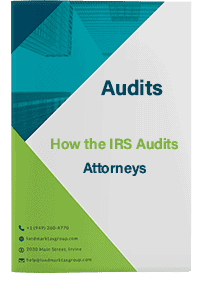As an attorney, you’re expected to know a great deal about the law. However, this doesn’t mean you’re necessarily up to speed on tax law, IRS requirements, and all of the intricate details involved with filing returns every year. Working in a profession that is highly demanding and often leaves very little time for anything else, it’s no wonder attorneys sometimes find themselves out of compliance with the IRS. From what we’ve seen over the years, the number one mistake attorneys routinely make when it comes to the IRS is failing to make timely and sufficient estimated tax payments.
What exactly are estimated tax payments, and what are the consequences for failing to make these payments?
Here’s a quick rundown on all you need to know about estimated taxes.
WHAT ARE ESTIMATED TAX PAYMENTS?
Estimated tax is a tax payment method that the IRS requires for certain individuals who don’t have taxes taken out from their wages. Instead of paying a lump sum tax bill at the end of the year, self-employed persons, freelancers, business owners and corporations/partners are instead required to make estimated tax payments in four installments. The income that counts for these estimated taxes can include dividends, typical income, rent, business earnings and other sources of untaxed income, and these figures are calculated using IRS Form 1040-ES.
It’s important to understand that there are extra stipulations when it comes to who must make estimated tax payments and who is exempt from the process:
You MUST make estimated tax payments if you:
- Are self-employed, a business owner, sole proprietor, partner or corporation shareholder who expects to owe more than $1,000 when your return is filed.
- A corporation that is expected to owe more than $500 when your return is filed.
You MAY have to make estimated tax payments if your tax was more than zero during the previous year.
You DON’T have to make estimated tax payments if you fall into all four of these categories (not just one):
- You were a U.S. citizen OR resident for the whole tax year.
- Your previous tax year was a full 12 month period.
- You didn’t have any tax liability the previous year.
- You receive wages and have sufficient federal tax withholding
As an attorney, it’s likely that you don’t fall into all three of these exemptions and you do owe more than $1,000 when your return is filed. Thus, estimated tax payments are a necessity.
WHEN AND HOW DO YOU MAKE ESTIMATED TAX PAYMENTS?
Estimated tax is different from your typical tax payments. Instead of being paid at the end of the year, estimated tax payments are required to be remitted four times throughout the year. The due dates for these payments are April 15th (January 1st – March 31st), June 16th (April 1st – May 31st), September 15th (June 1st – August 31st) and January 15th (September 1st – December 31st) of the following year. Each payment is associated with a specific income period, seen in the parenthesis above.
Using IRS Form 1040-ES, your income for these specific periods is calculated. These are then filed and submitted just like you would an end-of-year tax form. Taxpayers can also submit their estimated tax payments online, and for free, via the IRS website.
WHAT IF YOU DON’T MAKE YOUR ESTIMATED TAX PAYMENTS?
It’s strongly recommended that you make your estimated tax payments on time. If not, you can incur penalties and fees based on not paying or underpaying your estimated tax. Interest will also be applied. The interest is calculated on the difference between the amount you should have paid and the amount you actually paid. The interest rate fluctuates based on what the IRS sets quarterly; at the moment they range from three to four percent.
If you don’t pay your estimated taxes throughout the year and file your yearly tax return normally, the additional penalties, fees and interest can substantially increase your IRS tax liability. And if you miss the typical April 15th filing deadline, even more penalties will apply.
The best way for attorneys to avoid IRS penalties and tax headaches is to keep a close eye on your income and make your quarterly payments by the estimated tax deadlines. The process is simple and helps attorneys and other self-employed persons and business owners avoid paying more to the IRS than necessary. Remember, the best way to deal with the IRS is to avoid ending up on their radar in the first place.


